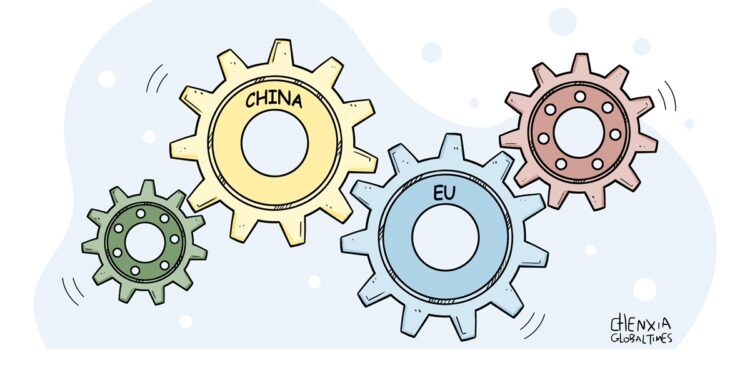Illustration: Chen Xia/GT
While divisions among EU member states on trade and investment policies may sometimes seem to favor Chinese investment, they actually lead to increased negotiation costs and uncertainties that hinder efficient cooperation. In the long run, an integrated EU economy is more conducive to establishing a stable and productive framework for China-EU cooperation.
EU member countries want to gut a list of critical technologies that would be subject to foreign direct investment (FDI) screening, Politico reported on Tuesday, citing three EU diplomats.
The European Commission in January proposed revising the FDI screening rules in a bid to prevent critical technologies from falling into the hands of so-called unfriendly powers like China, Politico reported.
While it remains unclear whether the original proposal would see any adjustment, it highlights the different opinions among EU member states regarding the European Commission’s efforts to raise investment barriers.
In light of the increasing geopolitical pressures surrounding Chinese technology investments, there is no denying that some in the EU have advocated for enhanced scrutiny of foreign investments, especially when it comes to critical technology sectors. However, other member countries place greater importance on the role of foreign investment in driving their economic growth and employment, especially in the context of a sluggish global economic recovery, making this demand particularly urgent. They are more inclined to retain control over sensitive technologies and to decide independently which investments need to be reviewed.
The differences within the EU toward Chinese technology investments could serve as a microcosm of broader challenges in the bloc’s economic integration process. These issues extend beyond just interactions with China; they also manifest in the EU’s relationships with major allies, such as the US.
The root of this internal division stems from the complexity and diversity of the EU’s integration process. As a political and economic union of multiple sovereign countries, the EU encompasses significant differences among its members in terms of economic development, political systems, and cultural traditions. Although the EU has indeed made great achievements in promoting integration, there is growing need for it to adjust and improve its policy coordination in the face of increasingly complex challenges.
For instance, when faced with foreign investments, countries often adopt varying investment strategies and review standards tailored to their own national conditions and interests. This divergence not only complicates internal coordination within the EU but also undermines the bloc’s overall competitiveness in global economic and trade cooperation.
If the EU truly revises its list of critical technologies in its foreign investment screening this time as reported, it could, to a certain extent, be viewed as a move to demonstrate flexibility in handling internal divisions and economic policies. In fact, the delegation of powers to member states does not necessarily mean that the EU has reduced its focus on security and political considerations.
For China, the integration challenges facing the EU increase the difficulty of investing in the European market. Although, on the surface, the internal divisions within the EU may provide more opportunities for Chinese investments in certain countries, in reality, the rising negotiation costs, along with overall uncertainty and geopolitical risks, will make the investment environment for Chinese companies in Europe more complex. This uncertainty and the risks are undoubtedly detrimental to long-term cooperation between China and the EU.
The EU, as a key economic partner of China, significantly influences the economic and trade cooperation between China and Europe through its integration process. Sustaining the EU’s integration not only helps to lower trade and investment barriers but also fosters collaboration across various sectors, including trade, investment, technology, and environmental protection. This integration plays a crucial role in creating a more stable and predictable business environment, allowing Chinese and European businesses to conduct cross-border business activities more efficiently.
If the EU can reconcile its internal division and establish a more unified investment policy framework by prioritizing economic rationality over political or ideological biases, its position as a more solid independent pole in a multipolar world will be consolidated.
Source link : http://www.bing.com/news/apiclick.aspx?ref=FexRss&aid=&tid=6747e2acee6940ab829c5d63c0d782f2&url=https%3A%2F%2Fwww.globaltimes.cn%2Fpage%2F202411%2F1323916.shtml&c=12332006375873962841&mkt=de-de
Author :
Publish date : 2024-11-27 07:26:00
Copyright for syndicated content belongs to the linked Source.



